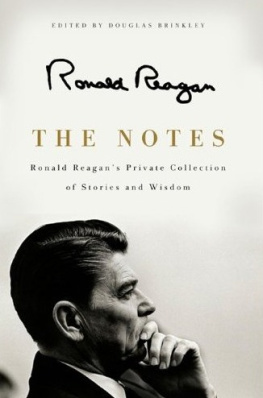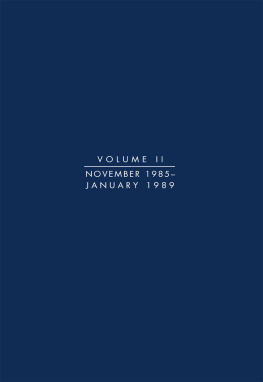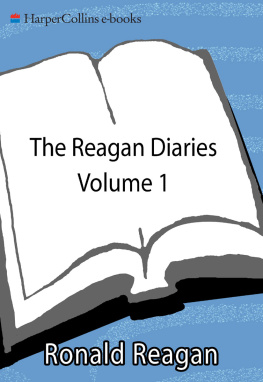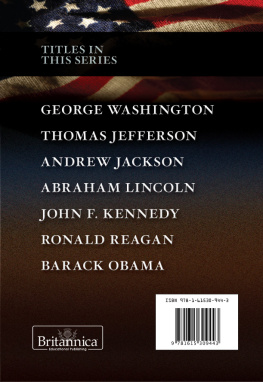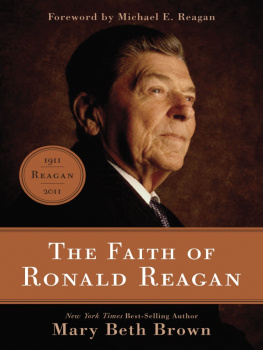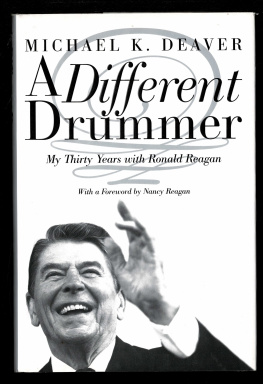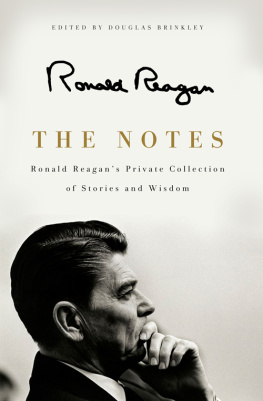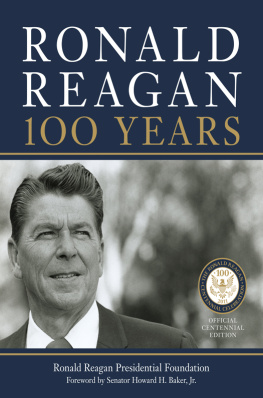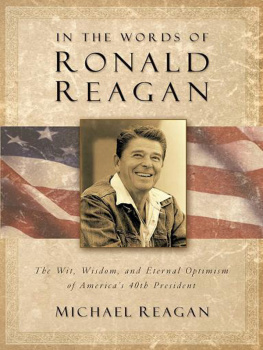Ronald Reagan - The Notes: Ronald Reagans Private Collection of Stories and Wisdom
Here you can read online Ronald Reagan - The Notes: Ronald Reagans Private Collection of Stories and Wisdom full text of the book (entire story) in english for free. Download pdf and epub, get meaning, cover and reviews about this ebook. year: 2011, publisher: Harper, genre: Science. Description of the work, (preface) as well as reviews are available. Best literature library LitArk.com created for fans of good reading and offers a wide selection of genres:
Romance novel
Science fiction
Adventure
Detective
Science
History
Home and family
Prose
Art
Politics
Computer
Non-fiction
Religion
Business
Children
Humor
Choose a favorite category and find really read worthwhile books. Enjoy immersion in the world of imagination, feel the emotions of the characters or learn something new for yourself, make an fascinating discovery.
- Book:The Notes: Ronald Reagans Private Collection of Stories and Wisdom
- Author:
- Publisher:Harper
- Genre:
- Year:2011
- Rating:4 / 5
- Favourites:Add to favourites
- Your mark:
- 80
- 1
- 2
- 3
- 4
- 5
The Notes: Ronald Reagans Private Collection of Stories and Wisdom: summary, description and annotation
We offer to read an annotation, description, summary or preface (depends on what the author of the book "The Notes: Ronald Reagans Private Collection of Stories and Wisdom" wrote himself). If you haven't found the necessary information about the book — write in the comments, we will try to find it.
The Notes: Ronald Reagans Private Collection of Stories and Wisdom — read online for free the complete book (whole text) full work
Below is the text of the book, divided by pages. System saving the place of the last page read, allows you to conveniently read the book "The Notes: Ronald Reagans Private Collection of Stories and Wisdom" online for free, without having to search again every time where you left off. Put a bookmark, and you can go to the page where you finished reading at any time.
Font size:
Interval:
Bookmark:
THE NOTES




THE NOTES
Ronald Reagans Private Collection of Stories and Wisdom


Edited by Douglas Brinkley

To all the men and women who
worked with Ronald Reagan in both
state and federal government
Contents
A t the Reagan Presidential Library in Simi Valley, California, its known as the Rosetta stonethe secret collection of 4-by-6 note cards on which our fortieth U.S. president recorded his favorite aphorisms, jokes, asides, and timeless nuggets of political wisdom. Although White House speechwriters such as Peggy Noonan, Ken Khachigian, and Tony Dolan had heard about Reagans private notes collection, even occasionally witnessing him snatching an appropriate note out of his Oval Office desk drawer to insert into a speech draft, no one except Nancy Reagan had ever seen the full assemblage. Just as the fact that Reagan kept a daily diary as U.S. president from 1981 to 1989 surprised most people, the publication of The Notes is an equally important landmark event in Reagan studies. Anyone wondering about how Reagandubbed The Great Communicatordelivered such oratorical magic as a dinner speaker and itinerant statesman should read this compilation. These notes reveal the real Reagana fiercely patriotic, pro-democracy avatar of limited government.
Its believed that Reagan started The Notes collection when he was serving as a spokesperson for General Electric, from 1954 to 1962. Compelled to deliver hundreds of upbeat speeches a year to the Fortune 500 companys far-flung employees, Reagan devised a pragmatic method of keeping his hour-long public presentations both high-minded and lighthearted. A consummate showman, Reagan always padded salient contemporary political points with a couple of Borscht Belt one-liners followed by a wallop of engraved truth from one of the Founding Fathers. All those optimistic Eisenhower-era speeches focused on the virtues of free-market capitalism over Sovietism. Reagan listened, before and after speeches, to GE workers complain about high taxation and unnecessary regulations. He assimilated many of their sentiments into his own.
The backstory of how The Notes were rediscovered in 2010 is endearing. Under the direction of former First Lady Nancy Reagan, the library was getting a face-lift in time for the centennial of her husbands birth (February 6, 2011). Fifteen million dollars was raised to renovate from top to bottom the 26,000 square feet of the original exhibit space in the museum. Reagan Foundation executive director John Heubusch issued a clear directive: Lets find some exciting, new artifacts to put on museum display. The foundations chief administrative officer and former Reagan aide Joanne Drake launched a hybrid treasure huntinventory to uncover hidden heirloomsno easy task, given the sheer bulk of boxes deposited at the Reagan Library.
One afternoon in the spring of 2010, The Notes , published here, were discovered in a cardboard box marked only in pen with RRs desk on its side. There was no label on it. It was randomly stashed among boxes of assorted Reagan memorabilia. What a Eureka moment. Here were the personal belongings Reagan had kept in his office desk right up until his death in 2004. No one but Reagan himself probably ever recognized the historic value of these treasured notes, which he kept among a mass of rubber bands and paperclips. About 95 percent of the Reagan Library archive belongs to the U.S. federal government. The remaining 5 percent of material is the property of the Reagan Foundation. This amazing box of handwritten Reagan leavingspersonal property owned by the former presidentbelongs to the foundation. A decision was soon made by the foundation to publish The Notes .
All of The Notes were handwritten. When Reagan was recopying various quotations he was especially neat. His scrawl is impeccableseldom does he employ a cross-out or correct a mis-start. Clearly, legibility was a high priority to him. Sometimes he uses an asterisk or makes a hearty underline for emphasis. Shorthand is often the order of the day. The reader gets the impression that Reagan is a redwood tree and these are the decorations of his own philosophy, the ammunition he will need to survive the hustings ahead.
In addition to admiring the former presidents penmanship, those who analyzed The Notes made some preliminary historical assessment. The notes that are published in this volume under the heading Humor are one-liners that were maintained in a fat stack of cards with a rubber band around them. They were separate from the rest of the collection. Whenever Reagan heard or invented a joke that he deemed a keeper, hed carefully write it out on a 4-by-6 note card and insert it in this stack. All the other axioms and aphorisms in this volumeall written in his own hand and found under the rubrics On the Nation, On Liberty, On War, On the People, On Religion, The World, On Character, and On Political Theaterwere kept in the plastic sleeves of a black photo album. There was no categorical arrangement of the notecards under headings. I devised that method to make it easier for the reader. This album artifact, the notecards yellowed around the edges, is now on permanent display at the renovated Reagan Library, unveiled as part of the 2011 centennial celebration.
Longtime friends of Reagans remember that sometimes when he delivered a speech hed throw the card of a joke that fell flat or of a nugget of political wisdom that tanked in front of an audiences ears into a wastepaper basket. What made it into the photo album were his golden oldies, his trench-tested winners, the intellectual ideas of notable others that best reflected his own worldview. At the collections core is Reagans bedrock belief that freedom and liberty come with the cost of being an alert and well-informed citizen. The collection constitutes a love song to America, the backbone of his most cherished ideas.
Many of the one-liners, jokes, high wisdom, straight talk, and political aphorisms in The Notes were delivered at one time or another in a public forum. If Reagan had one artifact that he would have saved were his house on fire, it would probably have been his card-stuffed photo album. Its contents were tools of his trade as GE spokesperson, roast master, California governor, and U.S. president. There are hundreds of Thomas Jefferson quotes, for example, that are regularly offered up by U.S. politicians at rubber-chicken dinners and in stump speeches. What is interesting is why Reagan gravitated toward the handful of Jefferson in this volume. Its his choices that are fascinating.
The reason the Reagan Library calls The Notes a Rosetta stone is that the general public can easily deconstruct from this collection Reagans own political philosophy. There is a gravitas to the quotes he chose to save in his private album. With the exception of the one-liners, all the collected wisdom in The Notes constitutes Reagans Greatest Hits. And there are some shockerswho ever thought Reagan would have found anything useful from Mao or Norman Thomas? Even Reagans political adversaries in America, like George McGovern, Walter Mondale, and Pat Brown, conceded that the Gippers great gift was an innate ability to deliver a pitch-perfect joke, put-down, or ice-breaking one-liner on cue. When Robert F. Kennedy debated Reagan in 1967 about the Vietnam Warand Kennedy lostKennedy recognized that his rival had honed his gladiatorial routine to utter perfection, with an acute sense of timing, aw-shucks nods, chuckles, and eye rolls. Reagan, RFK concluded, was the toughest debater I ever went up against.
Next pageFont size:
Interval:
Bookmark:
Similar books «The Notes: Ronald Reagans Private Collection of Stories and Wisdom»
Look at similar books to The Notes: Ronald Reagans Private Collection of Stories and Wisdom. We have selected literature similar in name and meaning in the hope of providing readers with more options to find new, interesting, not yet read works.
Discussion, reviews of the book The Notes: Ronald Reagans Private Collection of Stories and Wisdom and just readers' own opinions. Leave your comments, write what you think about the work, its meaning or the main characters. Specify what exactly you liked and what you didn't like, and why you think so.

